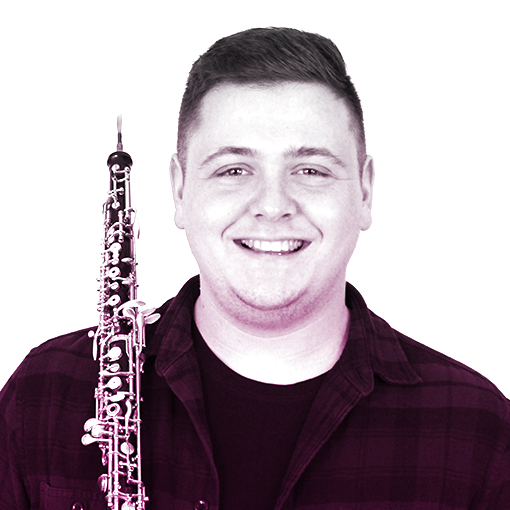Biography
I started playing the oboe around age 14, having previously played the flute. I decided to take up the oboe because it seemed unusual and I noticed that it got to play all the nice tunes and didn’t have to play all the fast notes like the flutes. Sadly, later on I realised oboes sometimes have to play fast things too!
Because my County Youth Music Service had very few oboe players, I was thrust into the advanced orchestra when I hadn’t been playing for very long and remember being incredibly taken with the music we were playing (Beethoven’s Symphony No.3) and how amazing some of the other players were. It was here that I really fell in love with orchestral music and realised playing the oboe was a great way to contribute to the sound of the orchestra.
I studied music at the University of Southampton, where I was able to study not only the oboe, but also conducting (acting as Assistant Conductor for the university chamber and symphony orchestras), and I was also a choral scholar. My journey with Southbank Sinfonia actually started while I was at university and did a week of work experience with the Orchestra Manager when I was still deciding whether to pursue arts management or performance. I remember thoroughly enjoying the week, but feeling like I wanted to listen to the orchestra play when I was needed in the office and this definitely weighed into my decision to pursue playing the oboe. After university, I successfully auditioned for postgrad courses and graduated from the Royal College of Music (RCM) having studied with Olivier Stankiewicz, Fabien Thouand, John Anderson and Christine Pendrill.
In the year following my master’s I worked as president of the RCM Students’ Union for a year, working closely with RCM staff and gaining a very interesting insight into the ‘behind the scenes’ of a music college. This busy role meant that I wasn’t able to play as much as I wanted and inspired me to push myself after leaving the post to play as much music as I could. Needless to say, I was thrilled to be offered the place in Southbank Sinfonia this year, a year later.
When I’m not playing the oboe, I still sing with some London choirs and sometimes pick up the baton and conduct an orchestra of young non-professional musicians which I founded called the Academy of St Mary-le-Bow. Away from music I’m a very keen cook and love turning my hand to a DIY project when I can. I’m also quite the Netflix connoisseur.
EDUCATION
Royal College of Music
London, UK
University of Southampton
Southampton, UK
OTHER PROJECTS
QUICKFIRE QUESTIONS
What is your favourite piece of music and why do you love it?
I don’t think I could pick just one piece of music, but the Mendelsohn Octet is definitely up there! Sadly as an oboist I will never get to play it. I can’t put my finger on why I love it so much, it’s just so perfectly constructed on a ‘technical’ level yet it feels completely organic. Not a single note is wasted and the parts interact so beautifully. Knowing he wrote it when he was just 16 only adds to the sense of perfection. It makes me happy every time I listen to it.
If you could reinvent the way we experience classical music, what would you change?
I think anything we can do to help a non-classical music fan to get underneath the music and connect with it is a good thing. Listening to classical music can feel intimidating and boring if you don’t know what you’re listening for, or what it means. Like listening to a story in another language, you will never be able to enjoy it unless you’re given at least some of the vocabulary. I’d love to see more concerts where the music is deconstructed for audiences so a wider range of people can take as much music from it as I do and access it on a less ‘highbrow’, more human level.
